|
|
|
Sort Order |
|
|
|
Items / Page
|
|
|
|
|
|
|
| Srl | Item |
| 1 |
ID:
165534
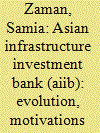

|
|
|
|
|
| Summary/Abstract |
China-led Asian Infrastructure Investment Bank (AIIB) was launched in 2016. Prior to that, the leadership and authority of the Multilateral Development Banks (MDB) were mainly controlled by the United States (US), Western Europe and Japan. Now the world has been experiencing the emergence of a new player in this domain, China. The China-led AIIB has sparked a major debate over China’s motivations behind establishing the Bank and the geostrategic implications of the Bank for both regional and extra-regional actors. Therefore, the paper endeavours to understand why China has created the AIIB. It also explores the geostrategic implications of the Bank for the region and beyond. Finally, the paper addresses certain challenges which the Bank needs to address to be a fullfledged MDB.
|
|
|
|
|
|
|
|
|
|
|
|
|
|
|
|
| 2 |
ID:
165536
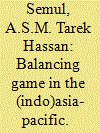

|
|
|
|
|
| Summary/Abstract |
The (re)emergence of China and the relative decline of the power of the United States (US) as the unipolar super power has shifted the geostrategic centre of gravity towards the Asia-Pacific region, also known in its extended form as Indo- Pacific region. Multiple new and frozen flashpoints have emerged in this region as China is increasingly seeking to tilt the power balance in its favour and the US is growing doubtful and impatient regarding the Chinese intentions. To mitigate the China threat, the US has already rebalanced its foreign policy under the Obama administration from the Middle East to the Pacific and current President Trump has extended the geographical reach of his new grand strategy of Free and Open Indo-Pacific to bring the Indian Ocean into play. One of the most predominant discourses that tries to explain this emerging great power relation and power transition is the ‘Thucydides Trap’. This discourse maintains a binary understanding that in a bipolar setting, the rise and decline of great powers make war inevitable. However, this oversimplified assumption may lead to a limited understanding of a region which has emerged with the support of the liberal order and slowly replacing the West as the epicentre of economic progress. This paper argues that there are ‘other discourses’ where middle and smaller regional powers not necessarily stranded between great power rivalry, rather they renegotiate the order in the (Indo)Asia-Pacific region to create multipolarity. On the contrary, the interdependence of the US and China in a globalized world compels the great powers to find ways to keep peace in the troubled waters of the Indo-Pacific. To find out to what extent all these discourses are intertwined and influence each other is another objective of this paper.
|
|
|
|
|
|
|
|
|
|
|
|
|
|
|
|
| 3 |
ID:
165535
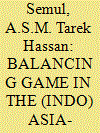

|
|
|
| 4 |
ID:
165532
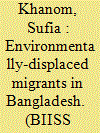

|
|
|
|
|
| Summary/Abstract |
This article has brought a critical perspective to the gendered nature of insecurity as experienced by environmentally-displaced migrants through their everyday experiences of insecurity and its effect on their long-term capability. Both anthropogenic interventions and natural calamities in the coastal zones directly affect one quarter of Bangladesh and the many people living in these regions. Unexpected flows of migration shape both the nature of cities and development processes. Dhaka already has a large influx of migrants and is expected to receive a greater influx of environmentallydisplaced migrants due to the better economic opportunities available there compared with other parts of the country. Different development sectors, utility services and infrastructure developments have expanded rapidly but have been unable to keep pace with the demand of the growing population. There is a lack of coordination between different government bodies in terms of implementation of policies, rules and regulations. The gap between service provision and demand is further exacerbated by mismanagement and brings every day to long-term insecurities of its residence. This insecurity also arises not only from ‘being a man’ or ‘being a woman’ or ‘being a migrant’, but is also due to specific practices, processes and power relations within the social institutions at individual, community, national and regional level. Environmental change is a global phenomenon and environmentallydisplaced migrants are forced to take the decision to migrate like refugees. Yet, the protection of environmentally-displaced migrants is neither fully a global nor a national responsibility. There remains insufficient attention to protect the rights of environmentally-displaced migrants.
|
|
|
|
|
|
|
|
|
|
|
|
|
|
|
|
| 5 |
ID:
165531
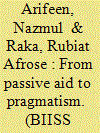

|
|
|
|
|
| Summary/Abstract |
The ideas espoused in ‘diplomacy’ inherently contradict what ‘humanitarianism’ entails, if one goes by the realist or neoliberal institutionalist schools in international relations. They contend that states, whose primary concerns are to maximize power or security in an anarchic international system, cannot have the indulgence to be humanitarian, theoretically speaking at the very least. Nonetheless, humanitarian diplomacy has been instrumental in resolving intractable conflicts and severe crises that states and the United Nations (UN) were unable to fix. This paper explores why the idea of humanitarian diplomacy has not caught on by focusing on its tension with state-centrism, legal weaknesses and the problem of politicization by powerful states. An evolving and thriving praxis of humanitarianism is, then, discussed as the international community strives to ameliorate human sufferings. Despite tensions arising mostly out of how humanitarian diplomacy has been (ab) used by powerful states, the paper traces new trends where states are shifting their focus from passive aid to pragmatism. Based on a case study of humanitarian diplomacy in the Rohingya crisis, the paper offers some evidence on how states utilize humanitarian diplomatic instruments.
|
|
|
|
|
|
|
|
|
|
|
|
|
|
|
|
| 6 |
ID:
165533
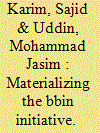

|
|
|
|
|
| Summary/Abstract |
A major thrust towards forming a new sub-regional grouping was observed when Bangladesh, Bhutan, India and Nepal, also known as BBIN, signed an agreement on 15 June 2015, titled “Motor Vehicle Agreement for the Regulation of Passenger, Personal and Cargo Vehicular Traffic between Bangladesh, Bhutan, India and Nepal”, with an ambition to facilitate seamless movement of passenger, personnel and cargo vehicles within the territories of each other. Signing of the agreement has ushered hope of a new sub-regionalism towards materializing BBIN through seamless transport connectivity. BBIN as sub-regional cooperation is still in formative stage and has to go a long way. This paper aims to evaluate three aspects. What are the developments so far within the framework? What are the challenges ahead of materializing BBIN and transport connectivity in particular? And what are the possible doings to address the concerns? The paper suggests five broad tasks, along with political commitment, to take into consideration: developing comprehensive arrangement; harmonizing standards, rules and regulations; mobilizing funds; exchanging information and research and developing an effective cooperation mechanism.
|
|
|
|
|
|
|
|
|
|
|
|
|
|
|
|
|
|
|
|
|